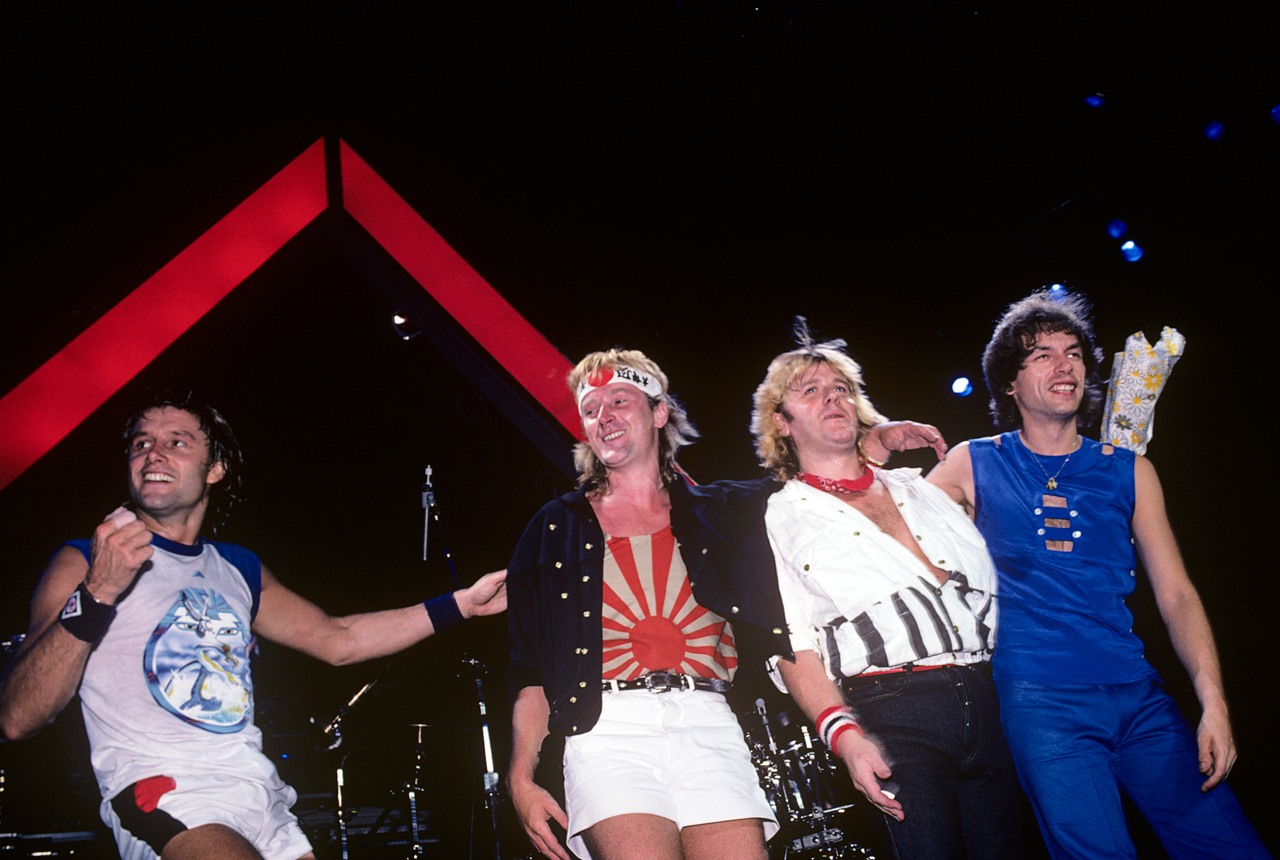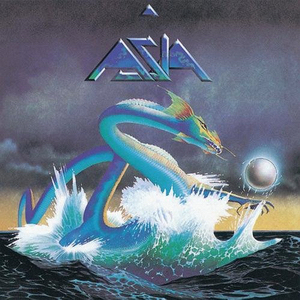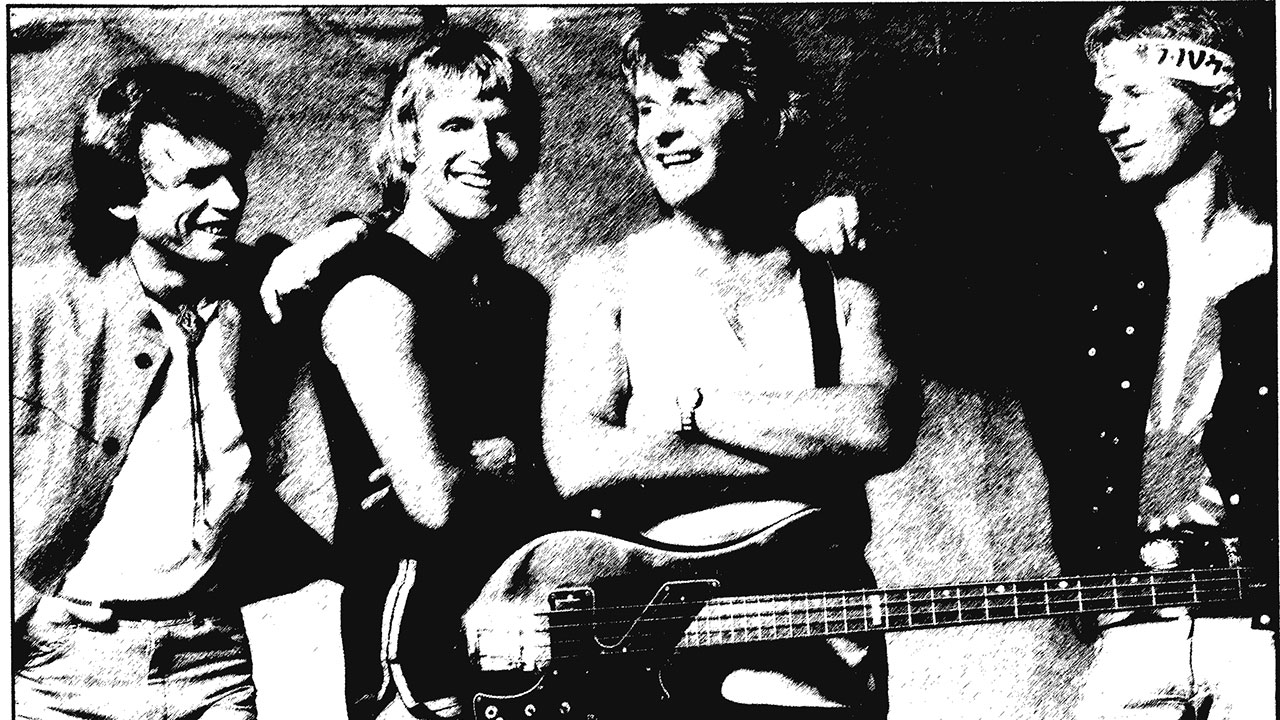The game-changing, self-titled debut album from a brand-new group named Asia was released on March 8, 1982. Though the band responsible was a fresh entity, its four members could not have been any more familiar. Guitarist Steve Howe and keyboard player Geoff Downes both came from Yes (before that, Downes had been one half of the chart-topping pop duo The Buggles). Carl Palmer boasted a lengthy resume that included The Crazy World Of Arthur Brown, Atomic Rooster and, most recently, Emerson, Lake & Palmer. Last but by no means least, on bass and vocals was John Wetton, formerly of Family, King Crimson, Roxy Music, UK and Wishbone Ash, among others.
A little over two months later, Asia had sailed past platinum-selling status to leapfrog Chariots Of Fire by Vangelis and land proudly atop the US Billboard album chart. Though it was displaced for three weeks by Paul McCartney’s Tug Of War, the album bounced back for a further seven weeks, spending a total of nine at the pinnacle. Come the year’s end, Asia was acknowledged as America’s best-selling record of 1982. At the last count it had accumulated sales of more than 10 million copies.
Disregarding the reputations of the participants, to outsiders the astonishing response to Asia might have seemed like an overnight success, but their achievements culminated in more than a year of planning, scrapping those intentions and returning again to the drawing board. Trevor Rabin, later a driving force of 90125-era Yes, was briefly a member. Incredibly, for a nanosecond The Move/Wizzard star Roy Wood had also been considered for the line-up. But in the end, Asia got the formula right, the four men deploying MTV to tap into America’s heartland.
Nevertheless, more than four decades later, progressive purists still pooh-pooh their efforts. Asia wasn’t pure prog rock though it was symphonic-enhanced rock music at its most sophisticated and classy. Thirteen years ago, speaking in the very first issue of Prog, Carl Palmer claimed that, with radio having turning its back on them, ELP simply “could not have carried on”. He added: “America had gone very, very corporate. So it was a case of repainting the armour.” What Palmer meant was that although a gleaming new chassis was fitted, beneath the bonnet the same reliable old engine remained.
Talking in the same Prog article some eight years before cancer claimed his life, John Wetton was unrepentant. “Prog rock was still deep inside the four of us, but with Asia we sliced away the fat,” he insisted. “We took our 12-minute songs and cut away the 10 minutes of noodling. The ingredients that we’d grown up with were kept, but we transposed them into a more succinct setting.”
Steve Howe once admitted to Prog that Yes had consciously de-commercialised their music. Now they were doing the opposite.
“We got our foot in the door with our biggest hit, Heat Of The Moment, before Yes came along with their own pop-rock song, Owner Of A Lonely Heart,” Howe says now. “Asia led the way. We didn’t see ourselves as rivals to Yes for two reasons: firstly they had disbanded, and secondly because we didn’t damn well want to be like Yes.”
However they pulled it off, against all the odds in 1982 the wildest dreams of Messrs Wetton, Howe, Palmer and Downes came true. “For a short while Asia were the band of the moment,” recalls Geoff Downes proudly. “That’s something nobody can take away from us.”
An early configuration of Asia involving Wetton, Palmer, Rabin and Rick Wakeman tentatively named The Group came together long before their actual birth, though Asia’s blueprint was drawn up even earlier still. Wetton was still with Roxy Music when, following a 1976 gig at the Santa Monica Civic, an odd-looking stranger approached him backstage. Demanding “What the fuck are you doing? Playing back-up to Bryan Ferry is not your destiny,” the mystery figure was John Kalodner, head of AOR West Coast for Roxy’s label, Atlantic Records. Intrigued, Wetton agreed to a pow-wow.
“Kalodner gave me the biggest pep talk ever,” Wetton told this scribe in 2001. “He said I could be mega and I left that lunch feeling brilliant. So we kept in contact, and each week John sent things that could be useful: some classical, some rock.”
Kalodner continued to groom Wetton for future stardom as a frontman and composer in his own right. Asia, as we know them, began when at the executive’s instigation Wetton started writing with Howe. Palmer and then Downes completed the team.
“Geoff and I had been left holding the baby that was Yes, and after 10 years of finding replacements I really didn’t want that anymore,” Howe explains. “Yes was like ELP: both commanded respect but there was no point in doing the exact same thing all over again. This was never going to be a Yes or an ELP cover band. Instead we set out to exploit John Wetton’s fabulous, powerful voice.”
For Carl Palmer, this was a relatively new way of working. ELP had enjoyed singles of their own, including Lucky Man and their reworking of Aaron Copland’s Fanfare For The Common Man, though the focus had always been placed firmly on their longer, more experimental moments.
“Asia covered both styles,” he says. “We still had progressive songs, but everything needed to be shorter, our pop songs of the utmost quality.”
In the hands of their former groups, with the exception of The Buggles, Cutting It Fine could have been a 20-minute epic. For Asia, however, CIF was the album’s longest track at five and a half minutes.
“It’s one of several pieces that would have filled out one side [of a vinyl album] in the past,” Palmer agrees. “ELP would never have taken that leap because Keith [Emerson] couldn’t write that way.”
Although Howe would ultimately contribute to five songs (six including a non-album B-side Ride Easy), it was Wetton and Downes who clicked as the band’s main writers.
“Not to compare Asia to The Beatles, but if John and Geoff were Lennon and McCartney, I was George Harrison,” says the guitarist. “I was fine with that. On the first record I was well accommodated.”
“Although I had been in Yes, I wasn’t part of that whole 1970s prog movement,” reasons Downes. “I was the new kid on the block. The other three were looking to take things into different areas, particularly John Wetton, who I think had grown tired of [prog’s more indulgent side]. Having come from the world of pop, I was an ideal writing partner.”
“John was always a great writer and arranger, but Geoffrey brought him a bit of culture,” adds Palmer.
With the album’s tracklisting seemingly finalised, Wetton belatedly revealed a trump card. The radio-friendly anthem Heat Of The Moment began the record and served as its first single, ultimately cracking the North American market for the group.
“It was the last song written for the album, and it’s the one that made Asia so successful,” says Downes.
“That song didn’t even have a middle eight,” Howe marvels, “but when John came in with it, I knew right away – if they didn’t like us after that one then they wouldn’t like us at all. Its appeal had a can-opening effect. Geoff and I had wanted to sing harmonies, but it’s the only song on the album that features John’s voice alone. He felt empowered to take it forward.”

When John Kalodner bowled up at Geffen Records, having hopped over from Atlantic, he found himself at a new label rich in both cash and ambition. This meant that the stars were aligned for Asia, though not without a warning shot across the bows from rival Virgin.
“One day at rehearsals, Richard Branson walked in with around six others from Virgin,” Downes recalls. “Branson and his entourage walked in single file, listened to some songs and made an offer of around $60,000 for rights for the UK and Europe to our manager Brian Lane. Lane considered that derisory, so Geffen made a very substantial offer for world territories and the rest is history.”
With a deal in place Asia met several big-name producers, including Bob Ezrin and Jimmy Iovine, though the latter was honest enough to inform the group that they could do the job themselves. It was Kalodner who suggested Mike Stone as producer. Having cut his teeth in a background capacity on albums by Genesis and Queen, a year earlier the Englishman had shared the board with Kevin Elson on Journey’s album Escape, featuring the now- ubiquitous Don’t Stop Believin’.
“Mike Stone was the perfect producer for Asia,” Downes states. “The music was on our side of the glass, so to speak, but Mike made us sound 10 times better than we had dared to imagine. He really understood what we were doing.”
“A producer should realise there’s nothing more important to a song than a lead vocal,” Howe adds. “Mike knew that, just like Trevor Horn knows it.”
With recording at two London studios completed, Asia were cautiously optimistic over the fate of their debut. “Of course it was an exciting time,” Howe remembers. “Listen, in my career, I had turned down bands that didn’t want a songwriter, just a guitarist. And I saw myself as much more than that.”
“We knew we had made a good album but the enormous commercial success that followed was pretty much unforeseen,” Downes admits.
The album was housed in an eye-catching sleeve designed by Roger Dean, who was also responsible for the group’s logo. It goes without saying that Dean had been a close collaborator for Yes from 1971’s Fragile onwards, and some within Asia’s circle objected to sharing the association. Carl Palmer was among them.
“Brian Lane and Steve Howe had wanted Roger involved from the beginning, I was not so sure,” the drummer admits. “ELP had always thought Roger very good at what he did, though possibly a little over the top. But in the end I was talked round.”
John Wetton was also of the same opinion, though in a strange coincidence he wrote the lyric: ‘You can concern yourself with bigger things/You catch a pearl and ride the dragon’s wings’ on the exact same day that Asia saw Dean’s painting, which features the scaled mythical creature rising from the sea as it chased the pearl of wisdom. Suddenly, everything made sense.
“It’s true,” Downes confirms. “John had preferred something a little more contemporary, but Roger’s design was a way of keeping one foot in that [prog] camp. It was a nod back to the pedigrees of the bandmembers, though Roger placed them in a new context.”

Songs and album art at the ready, the ball was now in the court of Geffen Records, a fledgling label named after David Geffen. As co-creator of Asylum Records, home of the Eagles, Geffen was among the most powerful men in the industry. Expensive pluggers took the singles to radio stations and the former 10cc duo of Godley & Creme, the hottest names in video, shot promos for Only Time Will Tell and Heat Of The Moment.
“A statement needed to be made,” Downes relates. “After a John Lennon solo album and a Simon & Garfunkel live set, Asia was the first band signed to the label. David Geffen had a point to prove, so no punches were pulled.”
None of the protagonists had ever made music to satisfy critics. But aware of the potency of what they had created, did they dare to hope this time might be different?
“I want to be respectful of the music press, but how many times have they said something was terrible and it sold 10 million copies?” Howe ponders. “We certainly were not trying to appease them, put it that way. I viewed Asia as an adventure; we were opening our careers out.”
Asia set out on a fairly modest US tour, mainly of college venues, before sheer demand outweighed reality. Most dates were sold out before a note of music had been heard. In a matter of months arenas beckoned. For three red-hot weeks they sold 80,000 records per day.
“I recall being in a car with John Wetton and channel-hopping the radio,” Downes grins. “On every station, within three songs you’d hear Heat Of The Moment. That’s how huge the album became.”
After Asia were knocked from the top spot, its creators felt a little indignant. “We asked David Geffen: ‘How do we get back up there?’ And he replied: ‘I can do that for you.’ I will leave the rest to your imagination,” Carl Palmer says, smiling mischievously. “Those were very different times.”
However, despite the opportunities presented by Geffen Records, in the longer term they were also responsible for killing the golden goose.
“With an album that enormous, we should have toured for 18 months and built a global audience,” Palmer rues. “Sadly, that didn’t happen.”
By the start of the following year Asia were locked away in an isolated residential studio in Canada trying to repeat the magic. As cabin fever set in, relationships frayed. Excluded from the writing process second time around, Alpha would be the final album to feature Howe until the Aqua reunion (of sorts) album in 1992 and before the original line-up reunited for 2008’s Phoenix. Alpha sold a million copies Stateside, where it reached No.6. In the UK, it charted at No.5.
These were crazy times for Asia. In 1983, weeks before their planned tour of Asia, John Wetton departed – there are conflicting stories about whether he quit or was sacked – and was replaced by Greg Lake. Though he was reinstated, the bonds of trust would take decades of healing. As the others left one by one, Downes carried the name alone until the regrouping of the principals.
“I will limit myself to three reasons for why things went wrong for Asia,” Steve Howe states now. “One: the second album was done too soon. There was too much pressure from the label to repeat its success. Two: I love Canada, but we were not on home soil. And three: the levels of commercialism. We were no longer being discerning about the levels of progressive rock that were so evident on the debut. It was a big mistake to think that suddenly we were a pop band.
“And if you’ll allow me a fourth reason, Mike Stone took a different route on Alpha, leaving the engineering to Paul Northfield. Paul is a great engineer, but there was something inspiring about Mike twiddling all of the knobs. Mostly, though, there was too much pop.”
One interesting aspect of the debut’s triumph was the reaction of the fans, who four decades later still regard Asia as a Marmite record. Even before the dawn of the internet Downes had suffered a taste of the entitlement and scorn of a more outspoken type of ‘fan’.
Mere mention of the record’s anniversary at Prog magazine’s readers’ group on Facebook provoked a wave of familiar criticism such as “this isn’t even prog” and “corporate rock performed by ex-prog musicians”.
For Downes, unafraid of channelling his personality’s more playful side on Twitter, this is water off a duck’s back.
“I’m used to being slagged off. When Trevor and I joined Yes it unleashed an unholy shitstorm,” he grins, before admitting: “It does annoy me when people claim that Asia were put together by record executives. They don’t realise how hard we worked on that first album.”
Despite the haters, and of course the sad passing of John Wetton, Asia are not going anywhere. Howe will sit out their latest bout of touring, but with Downes and Palmer joined by Yes bass player Billy Sherwood and newest member Marc Bonilla, a guitarist and lead vocalist who previously worked with Keith Emerson, belated plans to celebrate the 40th anniversary are being hatched. After neglecting their homeland in 2019, when guitarist Ron ‘Bumblefoot’ Thal of Guns N’ Roses and Sons Of Apollo fame acted as lead singer, it’s anticipated that British dates will be included.
Overall, there are few regrets. Steve Howe believes his role in the band vital to his career. “Being in Asia was good for me,” he considers. “I looked around and thought: ‘Where are Anderson, Squire, Wakeman and White? I’m doing this on my own’, which gave me tremendous confidence. In the future it allowed me to form GTR and to do solo projects. I was becoming a chameleon.
“I look back at that first album and there isn’t a song I don’t like,” Steve continues. “We were trying to stir up our music, to add new types of drama.”
“I will be completely honest with you, I really didn’t expect the scale of the success of the first album,” Carl Palmer concludes. “I just thought that we were doing the right thing. It was worth a shot, and it paid off.”
Originally printed in Prog Magazine #130

